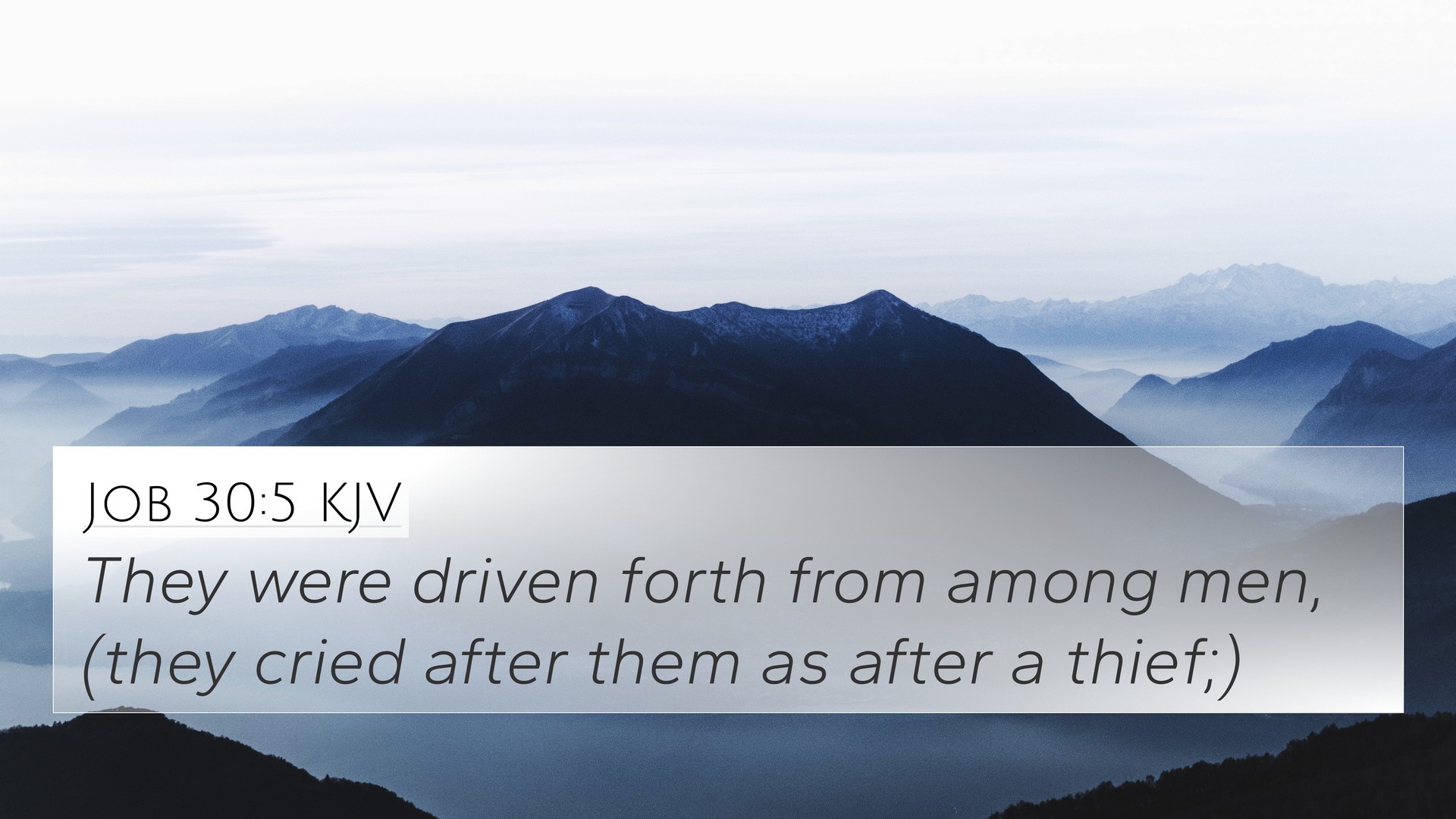Understanding Job 30:5: Summary of Commentary Insights
Job 30:5 states: "They were driven forth from among men, (they cried after them as after a thief)." This verse highlights the social degradation experienced by Job, who reflects on his former dignity compared to his current state. To better understand its meaning, we will explore insights from prominent public domain commentaries, providing a comprehensive analysis through the lens of cross-references and thematic connections found throughout the Scriptures.
Commentary Insights
The insights from Matthew Henry, Albert Barnes, and Adam Clarke provide a multidimensional understanding of this verse.
- Matthew Henry's Commentary:
Matthew Henry explains that Job is lamenting how those whom he once regarded as outcasts or lowly are now the very people who mock and scorn him. This social inversion serves as a stark reminder of the volatility of human status and the fickle nature of societal acceptance.
- Albert Barnes' Notes:
Barnes draws attention to the metaphor of being treated as a thief, indicating a grave stigma attached to Job. In the ancient Near East, thieves were contemptible, and Job’s reference implies a similar degradation. Barnes emphasizes the very real connection between Job's suffering and societal rejection, amplifying the theme of loneliness in distress.
- Adam Clarke's Commentary:
Clarke highlights the irony of Job's situation, where former companions now exhibit hostility towards him. It suggests a broader commentary on human nature's tendency to ostracize those who fall from grace — a warning against superficial judgments based on external circumstances.
Cross-References for Job 30:5
This verse has several pertinent cross-references that deepen the understanding of Job's plight and the theme of rejection:
- Job 29:10: "The young men saw me and hid themselves, and the aged arose and stood." This highlights Job's previous respect among his peers.
- Job 30:1: "But now they that are younger than I have me in derision." This foreshadows the disrespect he faces from those who once revered him.
- Psalm 22:6-7: "But I am a worm, and not a man; a reproach of men, and despised of the people." This reflects a similar experience of disgrace and alienation.
- Isaiah 53:3: "He is despised and rejected of men; a man of sorrows and acquainted with grief." A prophetic parallel suggesting that severe suffering leads to social rejection.
- Luke 6:22: "Blessed are ye, when men shall hate you, and when they shall separate you from their company." Connects to how societal rejection is treated in the New Testament context.
- Hebrews 13:13: "Let us go forth therefore unto him without the camp, bearing his reproach." This teaches the Christian approach to embracing rejection, similar to Job's experience.
- Matthew 5:11: "Blessed are ye when men shall revile you and persecute you." This reinforces the theme of finding blessing amid rejection.
Thematic Connections
Job 30:5 resonates within a larger biblical narrative concerning the themes of suffering, human dignity, and societal rejection. These connections enhance the understanding of Job’s trials and provide a broader insight into human experience as portrayed in Scripture. Here are some key thematic connections:
- The Suffering Servant: Job serves as a precursor to the suffering servant motif found prominently in Isaiah. Both demonstrate faithfulness amid overwhelming social condemnation.
- Faith and Adversity: The juxtaposition of past honor and present disgrace mirrors the trials faced by many biblical figures — a recurring theme in both the Old and New Testament.
- Divine Justice: The exploration of why the righteous suffer is central, with Job's experience linking to later New Testament teachings about the nature of suffering as part of God's plan.
Applications for Bible Study
This verse, when studied in conjunction with others, demonstrates the importance of cross-referencing biblical texts to uncover deeper meanings. To effectively study Job 30:5 and its implications, consider using:
- Bible Concordance: Identify and locate related verses easily.
- Cross-Reference Bible Study Tools: Employ guides specifically designed for tracing themes and terms across the canon.
- Comparative Studies: Engage in comparative analysis between Job and other biblical figures who experienced similar challenges.
Conclusion
In conclusion, Job 30:5 encapsulates a profound human experience shared by many throughout biblical history. By utilizing biblical cross-references and thematic connections, we gain a richer understanding of this verse, enabling us to appreciate the depth of Job's suffering and its implications for our lives today. Whether exploring Scriptural cross-referencing, thematic Bible verse connections, or inter-Biblical dialogues, this verse serves as a poignant reminder of the human condition and a call to empathy and understanding in times of distress.






